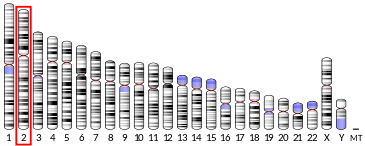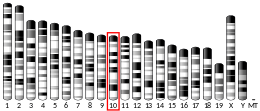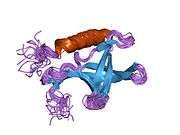RGPD5
| RGPD5 | |||||||||||||||||||||||||
|---|---|---|---|---|---|---|---|---|---|---|---|---|---|---|---|---|---|---|---|---|---|---|---|---|---|
 | |||||||||||||||||||||||||
| Identifiers | |||||||||||||||||||||||||
| Aliases | RGPD5, BS-63, BS63, HEL161, RGP5, RANBP2-like and GRIP domain containing 5 | ||||||||||||||||||||||||
| External IDs | MGI: 894323 HomoloGene: 87808 GeneCards: RGPD5 | ||||||||||||||||||||||||
| |||||||||||||||||||||||||
| |||||||||||||||||||||||||
| |||||||||||||||||||||||||
| Orthologs | |||||||||||||||||||||||||
| Species | Human | Mouse | |||||||||||||||||||||||
| Entrez | |||||||||||||||||||||||||
| Ensembl | |||||||||||||||||||||||||
| UniProt | |||||||||||||||||||||||||
| RefSeq (mRNA) | |||||||||||||||||||||||||
| RefSeq (protein) | |||||||||||||||||||||||||
| Location (UCSC) | Chr 2: 109.79 – 109.86 Mb | Chr 10: 58.45 – 58.49 Mb | |||||||||||||||||||||||
| PubMed search | [3] | [4] | |||||||||||||||||||||||
| Wikidata | |||||||||||||||||||||||||
| |||||||||||||||||||||||||
RANBP2-like and GRIP domain-containing protein 5 is a protein that in humans is encoded by the RGPD5 gene.[5][6][7]
RAN is a small GTP-binding protein of the RAS superfamily that is associated with the nuclear membrane and is thought to control a variety of cellular functions through its interactions with other proteins. This gene shares a high degree of sequence identity with RANBP2, a large RAN-binding protein localized at the cytoplasmic side of the nuclear pore complex. It is believed that this RANBP2 gene family member arose from a duplication event 3 Mb distal to RANBP2. Alternative splicing has been observed for this locus and two variants are described. Additional splicing is suggested but complete sequence for further transcripts has not been determined.[7]
Interactions
RGPD5 has been shown to interact with Transportin 1.[8]
References
- 1 2 3 GRCh38: Ensembl release 89: ENSG00000015568 - Ensembl, May 2017
- 1 2 3 GRCm38: Ensembl release 89: ENSMUSG00000003226 - Ensembl, May 2017
- ↑ "Human PubMed Reference:".
- ↑ "Mouse PubMed Reference:".
- ↑ Ciccarelli FD, von Mering C, Suyama M, Harrington ED, Izaurralde E, Bork P (Mar 2005). "Complex genomic rearrangements lead to novel primate gene function". Genome Res. 15 (3): 343–51. doi:10.1101/gr.3266405. PMC 551560. PMID 15710750.
- ↑ Hillier LW, Graves TA, Fulton RS, Fulton LA, Pepin KH, Minx P, Wagner-McPherson C, Layman D, Wylie K, Sekhon M, Becker MC, Fewell GA, Delehaunty KD, Miner TL, Nash WE, Kremitzki C, Oddy L, Du H, Sun H, Bradshaw-Cordum H, Ali J, Carter J, Cordes M, Harris A, Isak A, van Brunt A, Nguyen C, Du F, Courtney L, Kalicki J, Ozersky P, Abbott S, Armstrong J, Belter EA, Caruso L, Cedroni M, Cotton M, Davidson T, Desai A, Elliott G, Erb T, Fronick C, Gaige T, Haakenson W, Haglund K, Holmes A, Harkins R, Kim K, Kruchowski SS, Strong CM, Grewal N, Goyea E, Hou S, Levy A, Martinka S, Mead K, McLellan MD, Meyer R, Randall-Maher J, Tomlinson C, Dauphin-Kohlberg S, Kozlowicz-Reilly A, Shah N, Swearengen-Shahid S, Snider J, Strong JT, Thompson J, Yoakum M, Leonard S, Pearman C, Trani L, Radionenko M, Waligorski JE, Wang C, Rock SM, Tin-Wollam AM, Maupin R, Latreille P, Wendl MC, Yang SP, Pohl C, Wallis JW, Spieth J, Bieri TA, Berkowicz N, Nelson JO, Osborne J, Ding L, Meyer R, Sabo A, Shotland Y, Sinha P, Wohldmann PE, Cook LL, Hickenbotham MT, Eldred J, Williams D, Jones TA, She X, Ciccarelli FD, Izaurralde E, Taylor J, Schmutz J, Myers RM, Cox DR, Huang X, McPherson JD, Mardis ER, Clifton SW, Warren WC, Chinwalla AT, Eddy SR, Marra MA, Ovcharenko I, Furey TS, Miller W, Eichler EE, Bork P, Suyama M, Torrents D, Waterston RH, Wilson RK (Apr 2005). "Generation and annotation of the DNA sequences of human chromosomes 2 and 4". Nature. 434 (7034): 724–31. Bibcode:2005Natur.434..724H. doi:10.1038/nature03466. PMID 15815621.
- 1 2 "Entrez Gene: RGPD5 RANBP2-like and GRIP domain containing 5".
- ↑ Cai, Y; Miao S Y; Wang L F (Oct 2001). "[Determination of the binding site of testis-specific nucleoporin BS-63 to transportin (karopherin beta 2) and the proof of their combination in vitro]". Zhongguo Yi Xue Ke Xue Yuan Xue Bao. China. 23 (5): 462–6. ISSN 1000-503X. PMID 12905863.
Further reading
- Ota T, Suzuki Y, Nishikawa T, et al. (2004). "Complete sequencing and characterization of 21,243 full-length human cDNAs". Nat. Genet. 36 (1): 40–5. doi:10.1038/ng1285. PMID 14702039.
- Cai Y, Miao SY, Wang LF (2004). "[Determination of the binding site of testis-specific nucleoporin BS-63 to transportin (karopherin beta 2) and the proof of their combination in vitro]". Zhongguo Yi Xue Ke Xue Yuan Xue Bao. 23 (5): 462–6. PMID 12905863.
- Cai Y, Gao Y, Sheng Q, et al. (2002). "Characterization and potential function of a novel testis-specific nucleoporin BS-63". Mol. Reprod. Dev. 61 (1): 126–34. doi:10.1002/mrd.1139. PMID 11774384.
- Wiemann S, Weil B, Wellenreuther R, et al. (2001). "Toward a catalog of human genes and proteins: sequencing and analysis of 500 novel complete protein coding human cDNAs". Genome Res. 11 (3): 422–35. doi:10.1101/gr.GR1547R. PMC 311072. PMID 11230166.
- Wang LF, Zhu HD, Miao SY, et al. (1999). "Molecular cloning and characterization of a novel testis-specific nucleoporin-related gene". Arch. Androl. 42 (2): 71–84. doi:10.1080/014850199262904. PMID 10101573.
- Nothwang HG, Rensing C, Kübler M, et al. (1998). "Identification of a novel Ran binding protein 2 related gene (RANBP2L1) and detection of a gene cluster on human chromosome 2q11-q12". Genomics. 47 (3): 383–92. doi:10.1006/geno.1997.5119. PMID 9480752.




